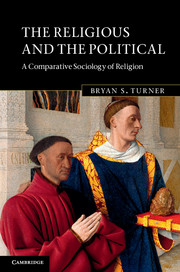Book contents
- Frontmatter
- Contents
- Acknowledgements
- Introduction
- Part I The religious and the political
- 1 Fear of diversity: the origin of politics
- 2 Charisma and church–state relations
- 3 City, nation and globe: the rise of the church and the citizen
- Part II State management of religion
- Part III Comparative and historical studies
- Part IV Conclusion
- References
- Index
2 - Charisma and church–state relations
Published online by Cambridge University Press: 05 April 2013
- Frontmatter
- Contents
- Acknowledgements
- Introduction
- Part I The religious and the political
- 1 Fear of diversity: the origin of politics
- 2 Charisma and church–state relations
- 3 City, nation and globe: the rise of the church and the citizen
- Part II State management of religion
- Part III Comparative and historical studies
- Part IV Conclusion
- References
- Index
Summary
Introduction: Max Weber on charisma
Fear of diversity suggests that there is a lack of trust in society, which could hold social groups together. While political leaders often look towards religion as a healing power in society, religions can be highly disruptive, producing difference and division. The paradox of religious charisma is that it is both constructive in forming new social groups and highly destructive of tradition and its conventional certainties. This chapter examines charisma and charismatic authority as a problem at two separate but related levels. First, I consider why charisma is a threat to the stability of existing social arrangements, and why it is in particular seen to be a threat to existing patterns of authority, both secular and religious. Various examples are provided in which we can consider how the state intervenes to regulate charismatic phenomena. Popular charisma in the Roman Catholic Church can be illustrated through the controversial case of Padre Pio of Pietrelcina, whose stigmata appeared in 1918, and whose career caused significant problems for both the state and the Roman Catholic hierarchy. In Chapter 4 I will examine the role of monarchy in democracies as an example of hereditary charisma in societies that are otherwise deeply secular. In Chapter 12 I take a further look at a modern example of a charismatic movement from South India in which the religious leader Sathya Sai Baba created a global movement on the basis of claims to religious authority, often based on his healing powers. Padre Pio and Sai Baba were challenged by external authorities who used scientific investigation to determine whether their claims to extraordinary powers were fraudulent, but these attempts to explain charismatic phenomena by empirical investigation and positivist methodologies failed to contain popular enthusiasm.
- Type
- Chapter
- Information
- The Religious and the PoliticalA Comparative Sociology of Religion, pp. 34 - 54Publisher: Cambridge University PressPrint publication year: 2013



